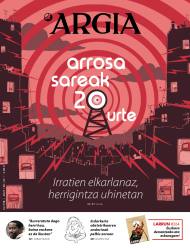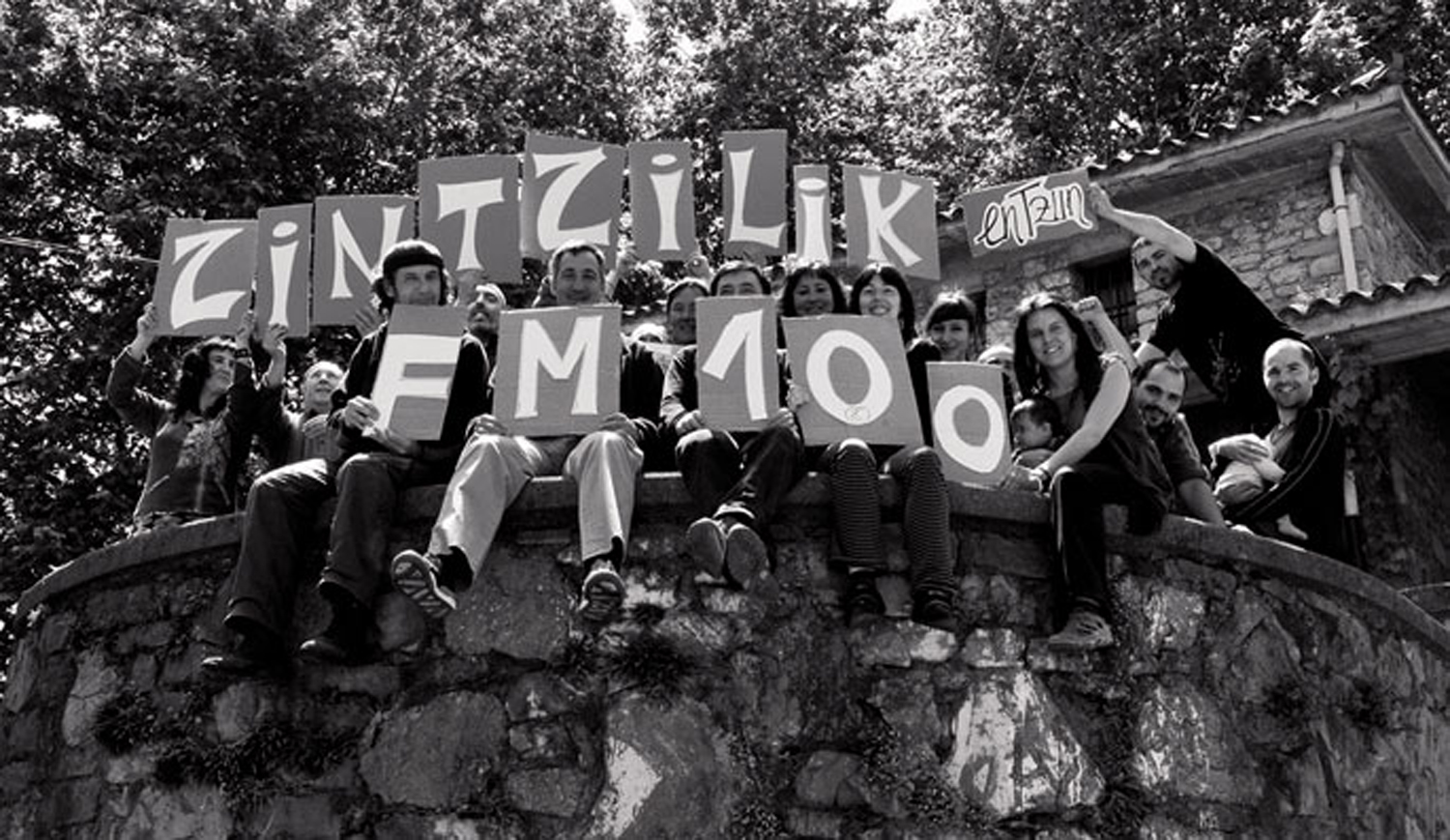Red Rosa: 20 years of attunement and free
- The network that links the free radios of Euskal Herria has reached two decades in June, reinforcing a nearby, diverse and Euskaldun radio ecosystem. They are based on mutual support.
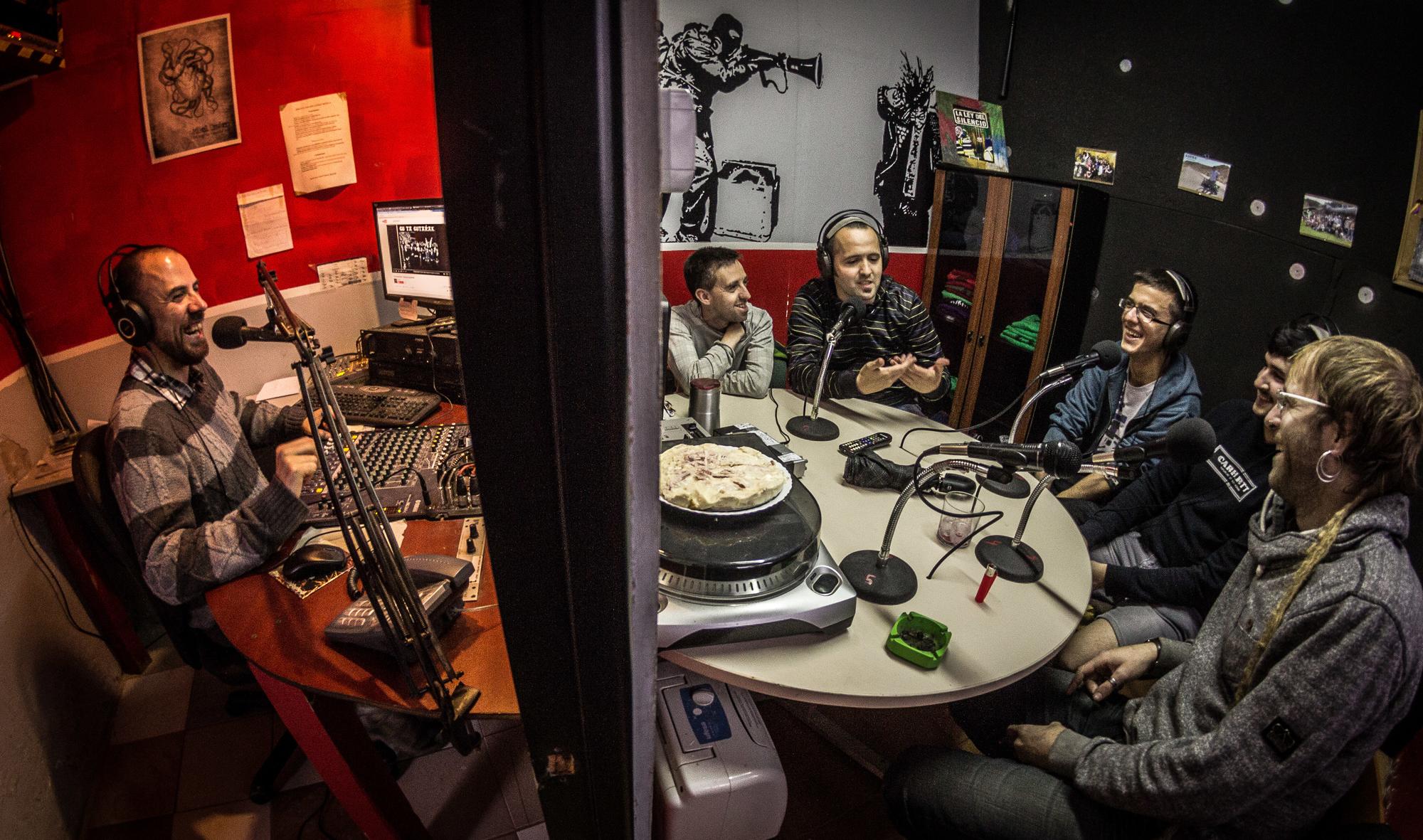
The original report has been published in the Hordago El Salto medium.
The Red Rosa de emisoras de radio en Euskera del País Vasco turns 20 in June. In 2001 Herri Mugi! The initiative organized a meeting of popular movements in Barria (Álava), in which several free radios were gathered at the communication commission of these days. “Tuning”. They understood that they should maintain collaboration, even for the future. Shortly afterwards, the founding meeting arrived at the festival Euskal Herria Zuzenean, in Rosa (Baja Navarra). They took the name of the village for the network. Twenty spring later, the network consists of 25 radios from all over Euskal Herria and about 60 weekly programs are shared. It is a joint effort of free local radios to reinforce an alternative on a dial composed primarily of public and private companies. In Basque.
Almost 20 years earlier, some friends, journalism students, started recording their radio programs in Bergara (Gipuzkoa), in Tas Tas de Bilbao (today 97 radios) and in the heat of the experiences of the Hala Bedi vitorian radios. Txapa Irratia, Bergara's free radio, was born. Iñigo Herreros is a sound technician and is working on the project almost from the start. First, a group gave them a place and then they got another assigned by the City Hall. "We have to get a computer, this will be a Criston," said a friend Herrero at the San Marcial festivities, shortly after the meetings in Barria. Although he was unable to attend, the members went to Baja Navarra and participated in the birth of the Red de la Rosa.
"For us the Rosa has been fundamental from the very beginning, being able to share programs to complete the programming grid has been an essential help," says Herreros. The veneer is a very variable radius, people come in and out, but there are always substitutes. Herreros started doing a music session with some friends, but now he's helping in the technical functioning of the radio. It is still remembered with the CD that contained five recorded music discs to fill the programming gaps that were placed over and over again. At the age of 37, Txapa Irratia shares more than twenty radio programs with the other broadcasters of the Red Rosa, and thanks to the exchange it can fill with content 24 hours of the programming every day.

Iraitz Gesalaga is coordinator of the Red Rosa and has been participating in the Radio Arraio in Zarautz for about fifteen years. In addition to helping smaller projects to fill in the list of programmes, the exchange of sessions between broadcasters functions as a loudspeaker to increase the dissemination of radio programmes. "Twenty years ago it was reflected: there are many local and free radios, but they are atomized," he explains. "In Euskal Herria we have psychological, and sometimes also physical, distances, such as the mountains, between one people and another. As a result, we often do not know what is happening in the neighbouring village," he added. The Red Rosa tries to reduce these distances, to be a meeting point.
A nine-kilometer straight line from Bergara, passing Monte Irimo, is the radio KKinZona Irratia, the free radio of Urretxu-Zumarraga. Haritz Berasategi, along with other members, produces the magazine Gaur Egur. The radio is in gaztetxe, and people who had been around their environment for more than ten years began to make macares and cheerful fanzines, in Berasategui's words, "to spread what we think." They then turned to the radio to convey opinions, ideas, criticisms and illusions.
For the collective of the Zone (the name is a joke of the time, the abbreviation of "what shrunk"), the radio is just one more means, but also more than one radio: Community communication project. In addition to starting the radio, fanzines are published without concrete frequency, they have made some comics and two amateur films. Communication has always been the key. "The force of radio is proximity, local. We try to get the village collectives into account, and we try to get them informed," says Berasategi. "Urretxu and Zumarraga are not Goierri, and although some media in the region publishes their own news, we felt there was a vacuum and proposed to fill them with what interests us."
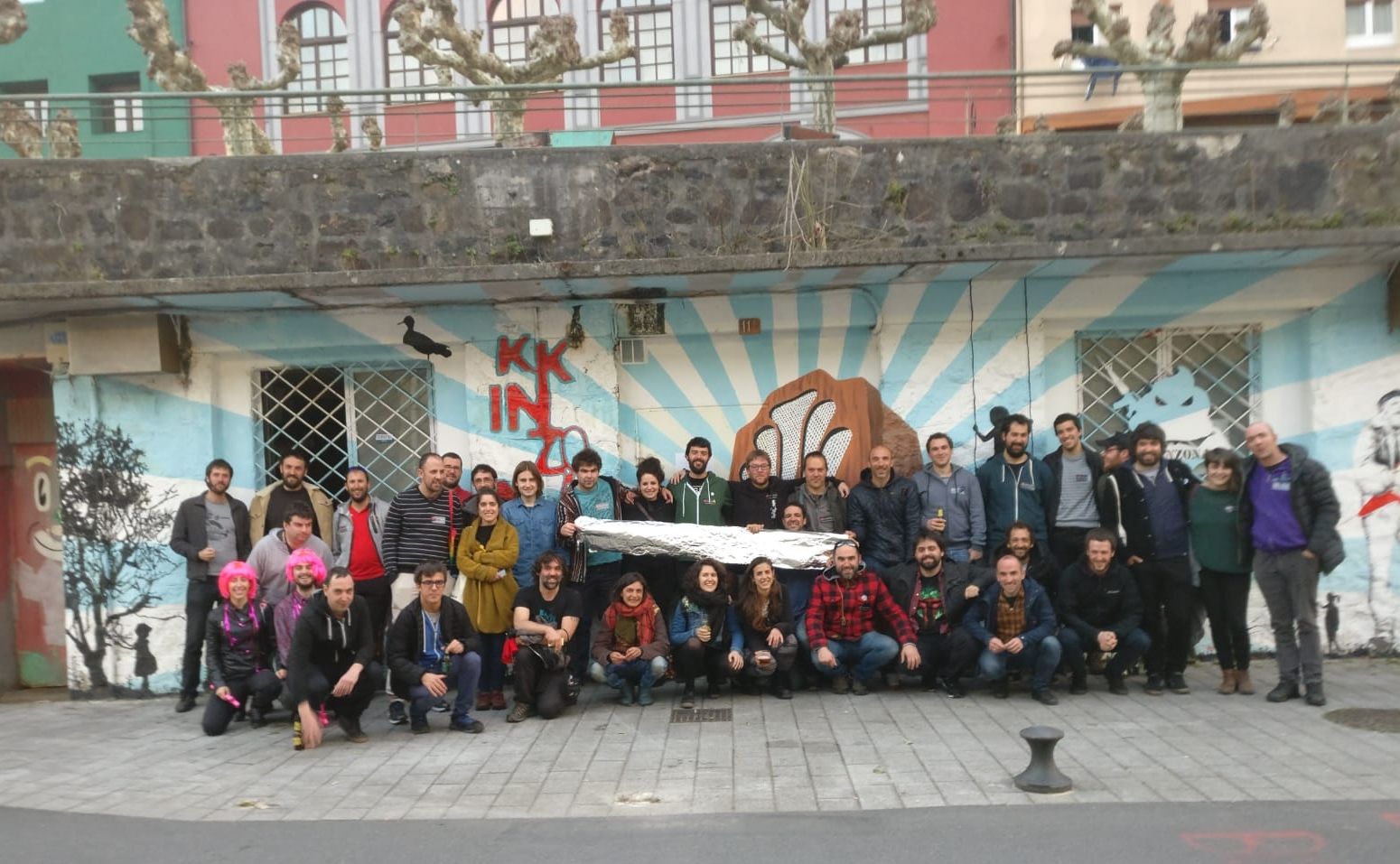
This passion for communication and the relationship with other groups and popular movements is very important for Gesalaga. Positive balance of the two decades of life of the Red de Rosa. "Continuing to grow the network and to continue to exist radio, despite all the difficulties, is a victory," he said. To search for the reasons, it resorts to its origin. "The fact that there are so many radios in a village as small as ours means it's a living thing. We've always been very attached to popular movements. We have to tell our realities, from our perspectives, and for that we need means, because if not, we don't, nobody else will," says Hala Bedi at the place he has in the Old Town of Vitoria.
Various waves
The collaboration yes, but respecting the characteristics of each broadcast, warns Gesalaga. It's not a simple idea, it's a practice. The Red Rosa is financed by contributions that each broadcaster pays according to its capacity. With that money, they keep the website, coordinate the contents, produce a magazine a week and pay the salaries of two people, one part-time and another one-third of the day. "The contract frees you from other things, but it doesn't give you the chance to live on just that. Most of the work is militant," said the coordinator, of two salaried people in Rosa.
Laixiar Irratia (Iurreta, Bizkaia), the youngest on the radios than the last to join the network, which Hala bedi and Naiz Irratia (formerly Info7, from a private communication company and which broadcasts all over the South), is not the same. It's a varied network: capabilities, ways to understand radio, ways to look and tell what's around us. There are also political differences. It is natural for Gesalaga, as the Rosa is a large space. Debates are taking place on all radio stations, as most are intended to be Community. "It's much more what unites us than what separates us," the coordinator of the Red Rosa stressed.
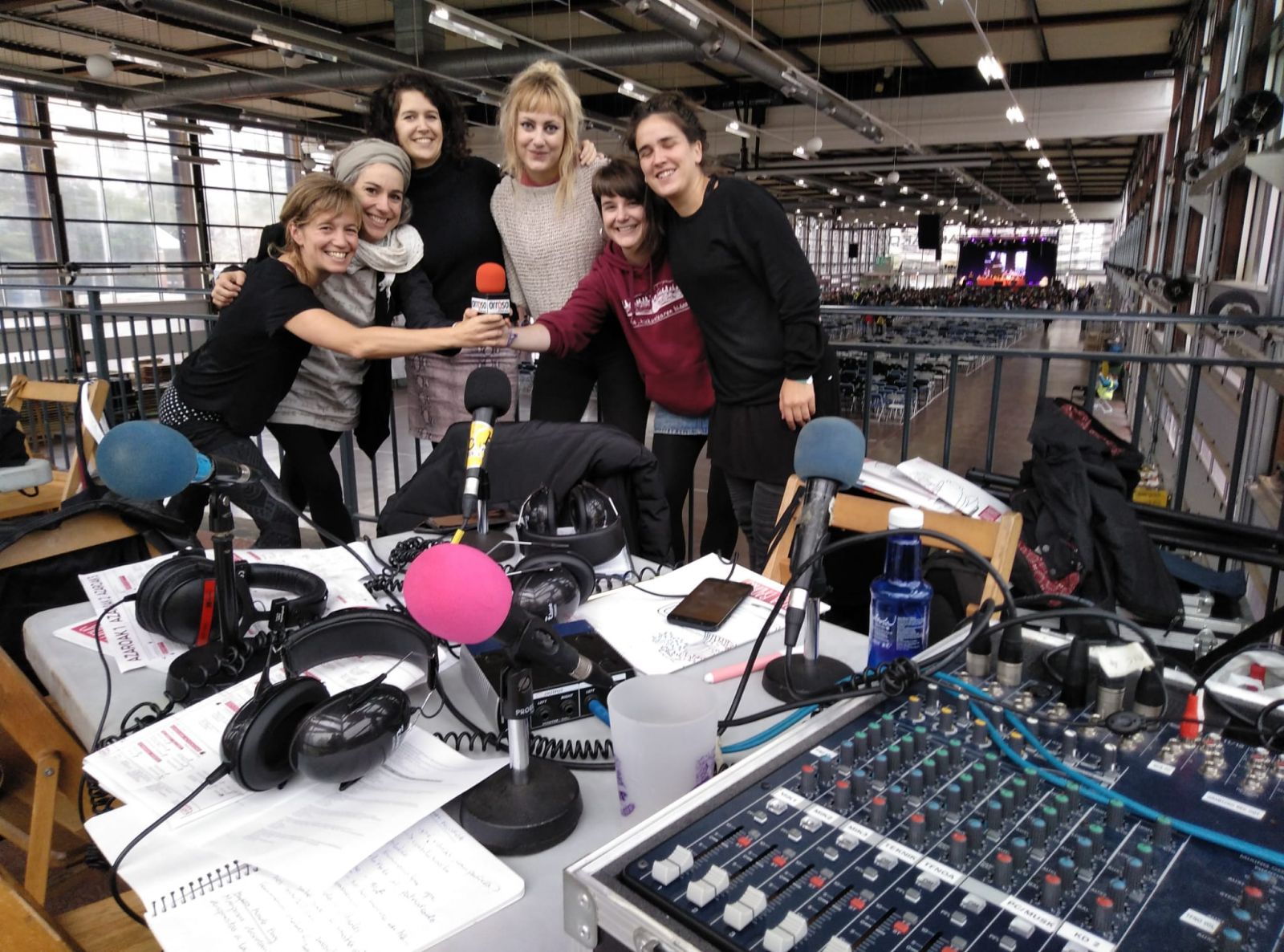
The characteristic of pink is that all the programs that share among the broadcasters are in Basque, although some broadcasters also broadcast programs in Spanish. The Basque Country and the territory – the Basque Country – that occupy the waves are the bases of the association.
Leo Bueriberi runs and produces the Paso del Cebra, a magazine that is broadcast on all the radios of the Rosa. It goes a little further: "Sharing, that collaboration between broadcasters makes us different from other ways of doing radio. There's family feeling, you know the others will be there to help you." It is about cooperating, sharing content, experiences and resources. In short, mutual aid. Bueriberi first approached Hala Bedi as a collaborator of the O program will not be about feminisms and the Hitz program.
The zebra crossing is, to some extent, the result of this collaboration. The contents of the session are based on the participation of different radio stations. In addition, it has a network of collaborators on various topics: economics, literature, music... They give voice to the friendly media, for example, with the weekly advancement of ARGIA magazine. And social movements also have their space, like the space that the BALA collective has to talk about sexual dissent. "News or dialogue marks political up-to-date," says Bueriberi's announcer. Of course, popular movements.
Law of the jungle
"Modulated frequency (FM) is the law of the jungle. The strongest, the one with the highest emission power, emits, and the rest to the fret," says Gesalaga. Turn to the usual analogy in the munshower. Creating an unlicensed radio is like occupying an empty house, but in that case the waves are the ones you take care of. The first thing you have to do is find an empty space on the dial, better if you don't have neighbors or don't bother them. As long as no one wants to throw you away, you will still be emitting in the limbo of the allegal.
In this case, the orography plays in favor of free radios. "There are many mountains and for technical reasons it is common to change the frequency of one town to another. In villages, it's pretty easy to find a place and keep it there. In cities, on the other hand, it's harder," explains Rosa's coordinator. Should the aim of free radio be to have a public licence, receive subsidies? In pink, each radio has decision-making autonomy. What is more, it has supported those who have tried it.
This is not the case for KKinZona or Veneer. They both feel comfortable in their villages, for decades issuing without licenses or subsidies, without big problems, and they have the freedom to "not depend on anyone." But the opposite is also the case. Bilbao Hiria Irratia has been without a license for more than twenty years, with full programming in Basque, from the metropolitan Bilbao to the metropolitan Bilbao. In 1997, the cooperative Zenbat Gara launched the radio, after the opening of the Kafe Antzokia, a leisure room, restaurant and bar with the aim of promoting Basque culture in the Basque capital.
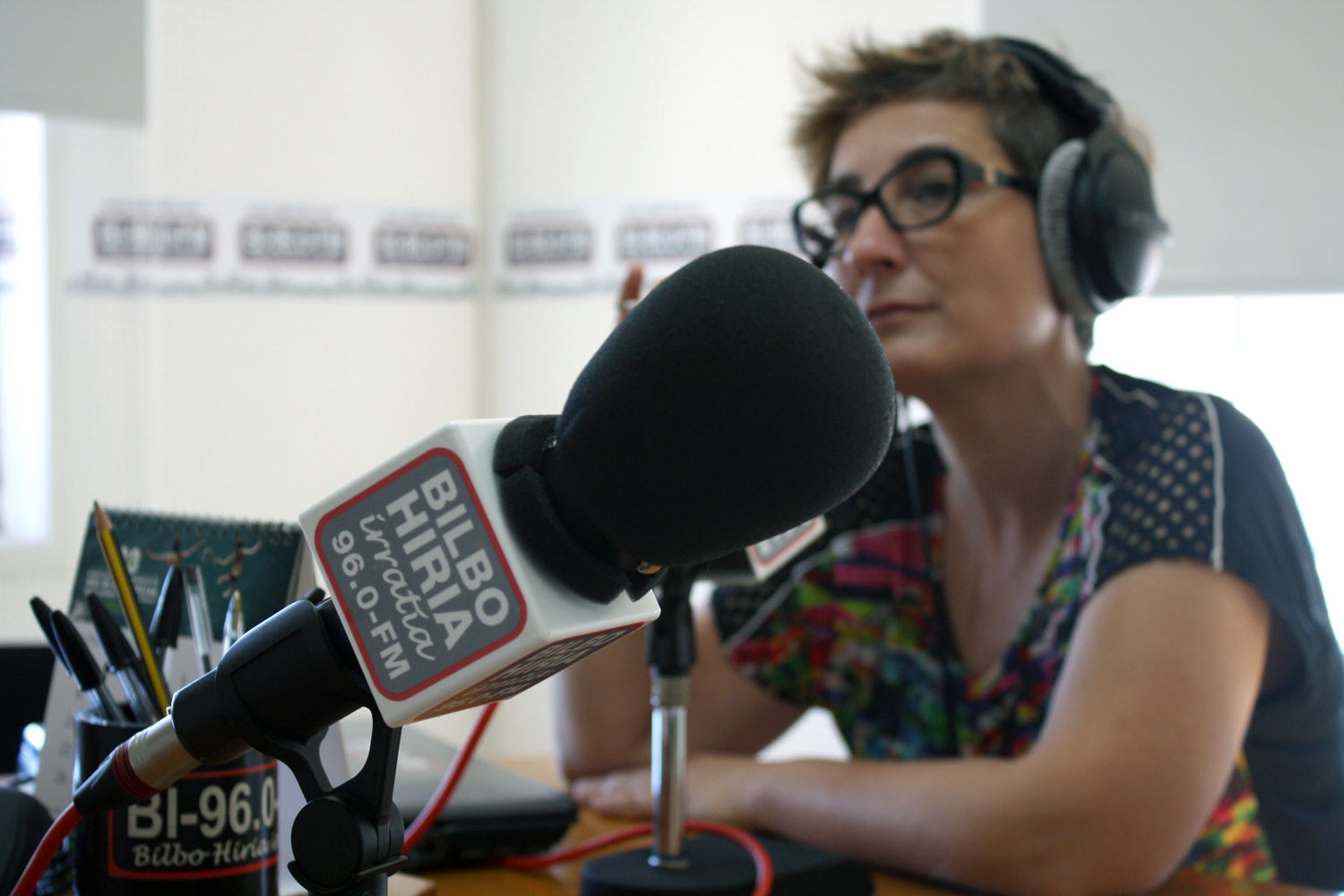
Ane Zabala is a journalist and enjoys listening and radio. In 2003 he approached Radio Villa de Bilbao, after being dismissed from Radio Euskadi, where he stood with open arms. So he started producing the Piperpolis cultural program, along with Galder Pérez. She is currently the coordinator of the Zabala radio.
In 2012 they presented to the public competition convened by the Basque Government, presided by Patxi López, to obtain the license. 34 licenses were awarded, four of them in Bilbao, two in Basque and two in Spanish. However, they knew it would be difficult. The City of Bilbao criticized that the competition did not contemplate community radios and wagered on commercial radios. "Not valuing the experience surprised us a lot. We had been emitting years. In addition, the criteria somehow penalized the Basque Country, as it only added points. And it should not be forgotten that it is the official language of the Basque Autonomous Community (CAV)," Zabala criticized.
The Basque Government, already in office, once the awards have been granted and published, decided to cancel the competition. Some broadcasters went to court and in 2014 the High Court of Justice of the Basque Country gave them the right. However, the Basque Government, presided at this time by Iñigo Urkullu, appealed to the Supreme Court. Finally, in 2019, they forced the government to distribute the licences granted in that competition and to pay certain costs of the process.
Two pink laughs got their licenses. Thus, Bedi obtained permission for the second dialect, Hala Bedi Bi, entirely in Basque. The first, which is broadcast in Basque and Spanish, was left out. Moreover, Naiz Irratia obtained seven licenses. Bilbao and Tas Tas Irratia were not licensed.
Before, in 1992, the Basque Government granted its last licences, after fighting with the Spanish authorities on the basis of their powers. According to Zabala, updating the dial and bidding more licenses was "hot potato", as behind each license there are great interests to be able to use a frequency. Most of the radio stations licensed in the CAPV come from large channels such as SER, Onda Cero or COPE, after a process of concentration and agreement with local radios.
Ane Zabala denounces that the vasco-speakers lost a space on the dial two years ago, when the results of the 2012 competition materialized, after seven years of process. One of the licenses reserved for radio stations in Euskera, 92.7 fm, was allocated almost entirely to a broadcaster of the SER network that broadcasts in Spanish. "We need references in Basque communication. Even if by demography, we are the most Basque city in Euskal Herria. In metropolitan Bilbao they live about a million people, but perhaps we do not see it as clear as the linguistic community. That’s why it may not be as easy here to live in Basque as elsewhere,” says the journalist. On the dial, the vast majority of radios broadcast in Spanish, a few are bilingual and only five are broadcast in Basque only. "Once again, losing the Basque Country," stressed the coordinator of the Villa de Bilbao.
Clouds and dials
On the day of the creation of the Red Rosa, in 2001, the Internet was ten years old. In just 20 years, our ways of relating to information, culture and the media in general have undergone profound changes in the hands of the network and communication technologies. And radio, as it couldn't be otherwise, is not out of this new virtual reality.
The Radio Villa de Bilbao, for example, was the first radio to broadcast live on its website in 2006, as Ane Zabala has proudly expressed. "Everything we do since then is stored in the cloud, where it can be accessed freely. We also thought about moving the rest of the file, all of the above, but maybe it would be too much. Here, in our studies, we no longer keep anything ", he acknowledged, referring to the number of files accumulated for years. Now all contents are saved as data on a server.
Aware of the new times, last year the Red Rosa faced new forms of production and listening to radio. Since then, a mobile app has been launched from which you can connect by streaming to any radio on the network. In addition, they add three podcasts to the content, although they are not created by radio stations.
"You have to bet on podcasts, people listen to them, but without broadcasts, without direct broadcasts, the radio loses its charm," says Herreros, who has also been managing content created by Rosa in Txapa Irratia. "We're clear, we'll stay in FM." Bueriberi believes that these new formats open up opportunities and ways to listen, which may better adapt to the rhythms of life that we lead. "I like one thing: that you stay. That time I could spend before on radio may not have it now. Today everything is in a hurry, but now you can be listening, leave it and then resume. That also has its magic," she confesses, not forgetting the charm of the radio of always: "Even if there's no direct link, it may not be that magical."
For Berasategui, podcasts, social networks and digital radio were not disruptive. The KKKinZona radio began to broadcast over the Internet and after a while managed to occupy a space in the modulated frequency, self-managed after conducting a study on its own. "If there are people there, we have to be there. The important thing is to listen,” he explains by summarizing the experience and philosophy of the collective. As long as there are stories to tell and messages to share, community radios will continue to make free sounds from the neighborhood to the whole world.








